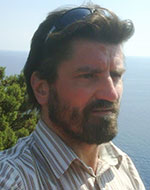Date: Wednesday, 17 April 2019
Time: 11:00-16:00
Room: C1062
Track Description
The Internet of Things, among its many uses, is a general approach for exploiting integration of sensor observations for situational awareness, aiding decisions, and taking action. This encompasses the range from the proper functioning of the of system of observations, to the connectivity and extrication of data from the object under observation, to the analysis of data from sensors fused with that from other relevant sources, and to the actions that are taken within an application. Almost, every science discipline and technology vertical are experimenting with and using this concept. However, in practical applications, the manifestations of IoT solutions can vary significantly. This can be traced back to the following factors:
- Need addressed
- Benefits expected
- Implementation feasibility
- Acceptance and adoption
The planned Track on “The Maritime Internet of Things” shall provide an overview of the unique requirements for IoT in a Maritime setting, ideas and solutions for current and future applications in this field. As the scope is broad, the need for having a strong involvement of different stakeholders from industry, end-users, the public sector, and academia and specific topics for discussions have been identified. The Track consists of three sessions and shall be structured according to:
- What is available and used today in Maritime IoT applications
- How can the communities learn from each other to come up with new technical solutions and shared infrastructure that is characteristic of IoT
- What is needed in the future to generate major breakthroughs for IoT in the Maritime domain
Lead representatives in the development and application of IoT in the Maritime domain will provide vivid examples of their work. We expect to address an overview of the needs within the Maritime domain, ranging from environmental research, to fishing and aquaculture, to shipping and transportation, and to extraction of natural resources, among others. We look forward to your participation!
Drafted by Christoph Waldmann, MARUM
Schedule
11:00-13:00 Session 1, Maritime Environments – IoT for Maintenance and Operations
Talk 1 “Measurement & Management of Network Latency in Remote Presence Applications”, Edin Omerdic, University of Limerick, Limerick, Ireland
Talk 2 “Introduction of Digital Sensors in Marine Engines to Prepare IoT Systems for Preventive Maintenance”, Bernard Clary, CMR Group, Marseille, France
Talk 3 “The Experience and Challenges Associated with Deploying and Maintaining Network Technologies and Equipment in A Harsh and Remote Maritime Environment”, John Burke, Irish Lights, Dublin, Ireland
Panel Discussion
13:00-14:00 Lunch
14:00-16:00 Session 2, IoT in Action – Maritime Ports and Facilities – IoT as a path to Industry 4.0
Talk 4 “The Port of Rotterdam’s IoT-Roadmap Toward its ‘Digital Twin’”, Erwin Rademaker, Port of Rotterdam, Rotterdam, The Netherlands
Talk 5 “The Building of IoT Solutions – Experiences from the Field”, Hein Dekkers, Cisco Systems, Amsterdam, The Netherlands
Panel Discussion, Wrap-up and Summary
Track Co-Chairs
Christoph Waldmann, University of Bremen
Senior Member IEEE
Member of IEEE Sensor Council
Education
10/1975-12/1981: Studying Physics in Munich and Kiel, Germany
12/1981-06/1985: Diploma in Physics at the University of Kiel, Germany
06/1985: PhD (Dr. rer. Nat.) University of Kiel, Kiel, Germany
Professional Career
07/1985-12/1989: DFG- Postdoc Fellow at Kiel University and Woods Hole Oceanographic Institution, USA
12/1989-12/1992: Postdoc at the Alfred- Wegener- Institute of Polar- and Marine Research, Bremerhaven, Germany
01/1993- 09/1996: Associate Scientist at the University of Kiel, Institute of Applied Physics, Germany
Since 10/1996: Senior Scientist at the University of Bremen, MARUM
Studies abroad
03/1987-02/1988: Guest investigator at the WOODS HOLE OCEANOGRAPHIC INSTITUTION, USA
12/2006-05/2007: Doherty Visiting Professor at the Florida Institute of Technology, Melbourne, Fl, USA
Daniel Toal, University of Limerick
Born in Dublin, Dan is a chartered engineer in Electrical and Systems Engineering: (Hons Dip Elec Eng, Dublin Institute of Technology; BSc (eng) University of Dublin (TCD) 1984; MSc – Manufacturing Systems Engineering, Cranfield University, UK, 1986; PhD Marine Robotics, University of Limerick (UL) 2004). He has worked in the Electrical Power and High Voltage sector with GEC in Britain. He has worked in Automation Research and Systems Engineering including major systems engineering reorganization projects in the UK and Ireland and has worked in AMT consultancy in the electronics industry sector. Daniel is currently an Associate Professor at UL and has taught: Automation, Robotics, Instrumentation, Avionics, Sensors and Electrical Machines. His research interests include: field robotics for challenging environments (land-based, marine, airborne / ROVs, AUVs, UAVs). Successes in research are the result of hard work driven by the vision that the Marine Technology, Ocean Environment; Renewable Energy Sectors will grow in crucial importance. Daniel is the founder and director of the Mobile & Marine Robotics Research Centre at the University of Limerick and is Co PI of the SFI Centre MaREI – Marine & Renewable Energy Ireland www.marei.ie. With the MMRRC research team, Dan has led the design/build of ROV Latis – a 1,000m depth rated ‘smart’ vehicle along with many other platforms. On-going research addresses unique challenges of operating in ’high energy’ wind, wave and tidal regimes of marine renewable and airborne wind energy. Research also addresses robotic platform development for response in offshore marine incidents, search and rescue (SAR) and marine salvage. Dan is collaborating with research and industrial partners in Ireland, across Europe and North America. He has been chief scientist for numerous off shore research surveys on Celtic Explorer, Celtic Voyager, INS LÉ Eithne, and other vessels. He has numerous Journals, book/book chapters, conference proceedings, invention disclosures, granted and pending patents in sonar technology and renewable energy (see publications tab). He has been awarded the Denny Medal – best journal paper award 2007/2008 – Journal of Marine Engineering. Technology. He has given numerous Plenary talks in Brazil, Korea, and elsewhere.
Track Speakers
John Burke
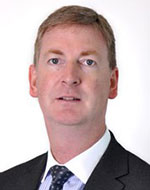 Director of Information and Communication Technology, Irish Lights
Director of Information and Communication Technology, Irish Lights
Talk Title: The Experience and Challenges Associated with Deploying and Maintaining Network Technologies and Equipment In A Harsh and Remote Maritime Environment
Irish Lights are a maritime organisation delivering an essential safety service, protecting the marine environment, and supporting the marine industry and coastal communities. Irish Lights have statutory responsibility for the provision and maintenance of marine aids to navigation around the coast of Ireland. John joined the Commissioners of Irish Lights as Head of Information Systems in 2000 and was appointed Director of Technology and Data Services in 2012 and Director of Information and Communication Technology (ICT) in 2019. The ICT team is responsible for developing and implementing new technologies as well as supporting existing systems and services for the benefit of both Irish Lights employees and stakeholders. The ICT team manage the communications networks that allow Irish Lights to provide the most cost effective mix of traditional and electronic aids to navigation for the mariner. These networks and systems provide the backbone for the delivery of the Differential GPS service and the monitoring and remote control of both Irish Lights and third party aids to navigation and infrastructure. The ICT department has two divisions, namely, Infrastructure & Operations and Business Solutions.
Bernard Clary
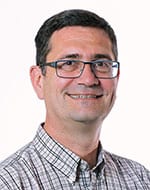 Bernard Clary is R&D and lab manager at CMR Group. He defines new product development and associated new technology strategy to create smart instrumentation and automation systems for a cleaner environment in energy, industry and marine. Bernard is graduated Master’s & Bachelor’s Degree in electronic, instrumentation, sensors and bus communications from the University of Aix Marseille, and a has got an MBA , Master of Business Administration in Switzerland. He operated about 6 years in CMR Group on smart sensors, monitoring and IOT and most of his 20 years carrier in the car industry as engineer, project leader , design office manager, then program Director on real time software, car ECU’s (engine control unit ) and associated diagnostic tools (Parma – Italian location).
Bernard Clary is R&D and lab manager at CMR Group. He defines new product development and associated new technology strategy to create smart instrumentation and automation systems for a cleaner environment in energy, industry and marine. Bernard is graduated Master’s & Bachelor’s Degree in electronic, instrumentation, sensors and bus communications from the University of Aix Marseille, and a has got an MBA , Master of Business Administration in Switzerland. He operated about 6 years in CMR Group on smart sensors, monitoring and IOT and most of his 20 years carrier in the car industry as engineer, project leader , design office manager, then program Director on real time software, car ECU’s (engine control unit ) and associated diagnostic tools (Parma – Italian location).
Talk Title: Introduction of Digital Sensor in Marine Engine to Prepare IOT System and Predictive Maintenance
Hein Dekkers
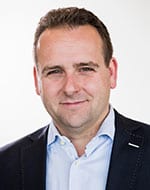 With 20 years of experience in IT Hein Dekkers currently serves as Technical Officer for Global IoT Sales at Cisco. In this role today he is technically responsible to push innovation and digitization for Cisco’s IoT architectures, with a primary focus on creating replicability. Especially where mobility finds strength across nation borders there is a need for digitization that covers both technical capabilities as well as (data) governance, security and auditability and where they go hand in hand. For this reason, Hein Dekkers is Cisco globally technical responsible for the orchestration of road-/ and harbor digitization.
With 20 years of experience in IT Hein Dekkers currently serves as Technical Officer for Global IoT Sales at Cisco. In this role today he is technically responsible to push innovation and digitization for Cisco’s IoT architectures, with a primary focus on creating replicability. Especially where mobility finds strength across nation borders there is a need for digitization that covers both technical capabilities as well as (data) governance, security and auditability and where they go hand in hand. For this reason, Hein Dekkers is Cisco globally technical responsible for the orchestration of road-/ and harbor digitization.
Hein has a rich background as a specialist in data extraction and delivery services. In that capacity, he has managed a portfolio of roads, Floating Car Data organizations and harbor projects where these are combined with the vision of SMART mobility. Hein has coordinated the implementation of innovative programs that address the ways we work, live, play and learn within the context of transport and logistic efficiency.
Typical innovation delivery and projects being worked on include Floating Car Data(FCD), Block chain technology, Smart Mobility Solutions, Road Digitization and Smart Ports. Where high-end broadband deployment as well as the hyper-distributed application architectures and service delivery models, that will help drive the digitization of society at large, are what is keeping Hein busy on a daily basis.
Edin Omerdic
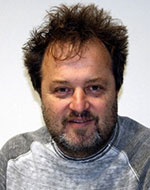 Edin Omerdic received the Dipl. Eng. and M.S. degree in Electrical Engineering from the University of Zagreb, Croatia, in 1997 and 2001, respectively. In 2001 he joined the Mechatronics Research Centre, University of Wales, Newport, UK and took part in the EPSRC funded IMPROVES project. He received his PhD in Electrical Engineering from the University of Wales in 2004, with the thesis titled “Thruster Fault diagnosis and Accommodation for Overactuated Open-frame Underwater Vehicles”.
Edin Omerdic received the Dipl. Eng. and M.S. degree in Electrical Engineering from the University of Zagreb, Croatia, in 1997 and 2001, respectively. In 2001 he joined the Mechatronics Research Centre, University of Wales, Newport, UK and took part in the EPSRC funded IMPROVES project. He received his PhD in Electrical Engineering from the University of Wales in 2004, with the thesis titled “Thruster Fault diagnosis and Accommodation for Overactuated Open-frame Underwater Vehicles”.
Edin is currently employed by the University of Limerick as a Senior Research Fellow at the Department of Electronic and Computer Engineering. He is engaged in numerous research projects funded by the Higher Education Authority and the Marine Institute in the area of submersible robotics; he is also the main developer & designer of OceanRINGS concept & software suite, including the design of state-of-the-art control architecture for ROV LATIS, MRE ROV and I-ROV. Edin’s research interests include: Modelling & Simulation of Dynamic Systems, Real-Time Simulators & Real-Time Embedded Control Systems, Virtual Reality, Augmented Reality, Simulated Reality, Multi-Modal Human Machine Interface for Cyber-Physic Systems based on AI techniques (VR headsets, speech recognition, hand gesture recognition), Machine Learning, Application of AI Techniques (Neural Networks and Fuzzy Logic) in Intelligent Systems, Guidance, Navigation and Control System for Marine Platforms, Nonlinear Control Systems, Underwater Robotics, Fault-Tolerant Systems, Internet of Things and Network Security.
Talk Title: Measurement & Management of Network Latency in Remote Presence Applications
Remote Presence technology, developed by researchers at CRIS, UL, enables real-time control of remotely operated vehicles (ROVs) from a remote control centre via the Internet. Extension of Remote Presence to enable measurement of network delay (latency), including video latency in real-time video streaming applications, is the main topic described in this presentation. The overall idea is to have a remote robotic system permanently deployed offshore, capable of delivering IRM, while the operator/pilot can control the system over the Internet from anywhere in the world. Both ends are synchronised to the same reference clock via Stratum 1 GPS-enabled NTP servers. The requirements, which are imposed on the network link, must comply with the constraints for near-real-time control of a marine ROV system used as a remote tool for Inspection, Repair and Maintenance (IRM) operations on offshore oil & gas subsea structures. Various communication protocols are used to measure network latency and its influence on overall performance. The presentation will also include the application of Remote Presence in a real-world environment.
Erwin Rademaker
 Since 2002, Erwin Rademaker works with the Port of Rotterdam. He is an international award winning programme manager and currently responsible for Smart Infrastructure, enabling the Internet of Things at and the Digital Twin of the Port of Rotterdam. https://www.linkedin.com/in/erwinrademaker
Since 2002, Erwin Rademaker works with the Port of Rotterdam. He is an international award winning programme manager and currently responsible for Smart Infrastructure, enabling the Internet of Things at and the Digital Twin of the Port of Rotterdam. https://www.linkedin.com/in/erwinrademaker
Talk Title: Port of Rotterdam’s IoT-Roadmap Towards Its ‘Digital Twin’




